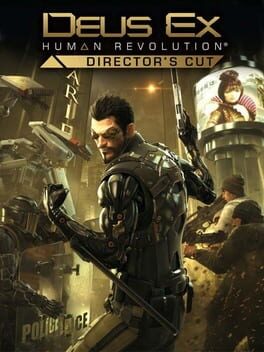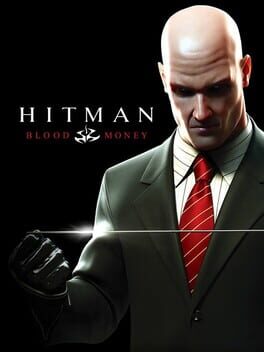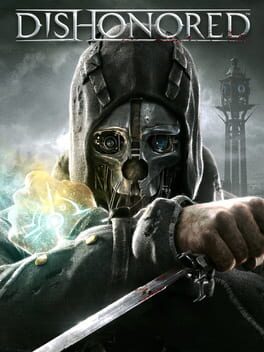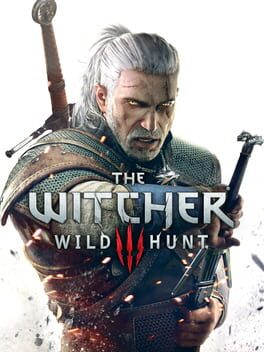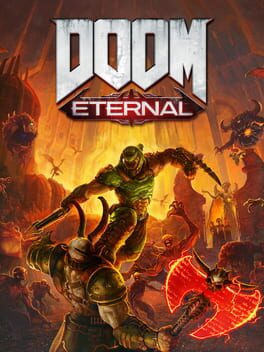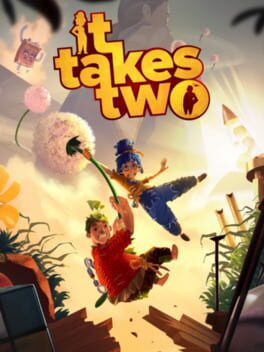High5
29 reviews liked by High5
Fallout
1997
I would love to play more of this, but I don't know where my Wii U gamepad is and haven't for months. :(
Technically, I own this on PC. But I ADORE controller gimmicks, and the Wii U port of Human Revolution surprisingly delivers in that department. Granted, it's apparent that the game wasn't designed around the Wii U gamepad, and it's not necessary to play through the game. But the inclusion of your map, inventory screen, hacking interface, and so on on a second screen is something that's irresistible to me. There's also a strategy guide built-in. I don't care if you don't need it; that's fucking RAD.
But yeah, anyway, it's a pretty good game.
Technically, I own this on PC. But I ADORE controller gimmicks, and the Wii U port of Human Revolution surprisingly delivers in that department. Granted, it's apparent that the game wasn't designed around the Wii U gamepad, and it's not necessary to play through the game. But the inclusion of your map, inventory screen, hacking interface, and so on on a second screen is something that's irresistible to me. There's also a strategy guide built-in. I don't care if you don't need it; that's fucking RAD.
But yeah, anyway, it's a pretty good game.
Far Cry 5
2018
If I had one word to describe Far Cry 5, it would be dull.
Its Open World is gorgeous and entices exploration in fun ways. But its lack of variety in objectives dulls that. Its setting is promising, but it doesn't have the balls to commit to anything compelling. Its characters and story are too dull to entice. The music that you listen to while you drive around is dull; somehow, after years of tinkering around with the Open World format, Ubisoft fails to realize that having good licensed and original music is part of the charm.
I could go on. I didn't finish this and I don't intend to, although maybe I'll be bored enough to try it again one day.
Its Open World is gorgeous and entices exploration in fun ways. But its lack of variety in objectives dulls that. Its setting is promising, but it doesn't have the balls to commit to anything compelling. Its characters and story are too dull to entice. The music that you listen to while you drive around is dull; somehow, after years of tinkering around with the Open World format, Ubisoft fails to realize that having good licensed and original music is part of the charm.
I could go on. I didn't finish this and I don't intend to, although maybe I'll be bored enough to try it again one day.
Hitman: Blood Money
2006
While the latter games in this series are undeniably more polished experiences, Blood Money still manages to be a memorable time. Maybe it's the jank that makes me love this so much. There's something exhilarating about pushing people, and the melee combat--hilariously broken as it is--only adds to the amusement factor.
That might not seem like high praise, considering one man's trash is another man's treasure and vice versa. But even if you aren't a fan of just how 2006 the whole thing is, the variety on play here will keep you interested long before the credits start rolling. The Hitman series has almost always nailed level variety, and Blood Money is no exception.
But what I really love about this game is that the cheats that are secretly built into it are really, really stupid. If you want a good example of why, here's me beating the game in less than twenty minutes using nothing but cheats, and here's me doing the same thing but with slightly more attitude attached. This is more or less an excuse for me to shamelessly plug some of my "work," but even if you aren't trying to break the game in record times, it almost creates this sandbox within the already established sandbox. A couple of the cheats are broken: if you're playing past the 1.0 release, don't use Give All. Using it more than once causes your game to crash. And if you decide to use a weapon that's not in the level you're playing, you're probably going to crash, anyway. The timemultiplier cheat is funny because it breaks all of the animations, but it requires a key spammer if you're going to use it past a certain speed. Other than that, it's a bizarrely enjoyable experience for those of us who still think that cheating in games is the funniest thing.
That might not seem like high praise, considering one man's trash is another man's treasure and vice versa. But even if you aren't a fan of just how 2006 the whole thing is, the variety on play here will keep you interested long before the credits start rolling. The Hitman series has almost always nailed level variety, and Blood Money is no exception.
But what I really love about this game is that the cheats that are secretly built into it are really, really stupid. If you want a good example of why, here's me beating the game in less than twenty minutes using nothing but cheats, and here's me doing the same thing but with slightly more attitude attached. This is more or less an excuse for me to shamelessly plug some of my "work," but even if you aren't trying to break the game in record times, it almost creates this sandbox within the already established sandbox. A couple of the cheats are broken: if you're playing past the 1.0 release, don't use Give All. Using it more than once causes your game to crash. And if you decide to use a weapon that's not in the level you're playing, you're probably going to crash, anyway. The timemultiplier cheat is funny because it breaks all of the animations, but it requires a key spammer if you're going to use it past a certain speed. Other than that, it's a bizarrely enjoyable experience for those of us who still think that cheating in games is the funniest thing.
Dishonored
2012
Dishonored is one of the few games I've ever played where a direct recommendation of "play this with a controller/keyboard and mouse" cannot be made. Generally speaking, I enjoy playing stealth games with a controller. Stealth, like racing games, is a genre that benefits greatly from analog sticks. At the heart of a great stealth game is nail-biting tension and suspense. Vulnerability is stressed through risk outweighing reward. On a keyboard, all of your inputs are static. Are you pressing up? Good, you're moving up. Jolting an analog stick up can mean the difference between shuffling silently and bringing in nearby ears for inspection. Even in games where this choice tends to be an illusion, it heightens the already high stakes of weaving in and out of crowded spaces as little more than a specter in the night. If that's how you choose to play Dishonored, I recommend it. Leaning and inventory management can feel a little less natural than they would on a keyboard, but they're functional and aren't as distracting as they could potentially be. In the words of Godd Howard himself, "it just works."
The other side of the coin is this: combat-based playthroughs require vastly more precision than two analog sticks can allow. Far from the stealth game half of this game is, aggressive playstyles in Dishonored turn the game into a psychotically frenetic action-platformer about style. The ability to teleport goes from a neat tool for traversing large areas undetected to a weapon that allows you to change your position on the fly. Double jumping allows you to exploit the verticality of each level, creating moments where countering an attack means raising a blade from above as often as it does parrying a swing. Grenade kills are a gory spectacle that separates torsos from limbs and then torsos from themselves. But this brutality exists for more than shock value alone. Each decapitated body part can be picked up and thrown to be used as a distraction or to stagger oncoming attacks. Being of the same lineage of Dark Messiah, Dishonored features a host of supernatural abilities to go alongside teleportation, one of which allows you to throw enemies to the ground with a gust of wind. Paired with the ability to stop time completely, falling bodies go from quick executions to rather grim bridges used to access nearby rooftops. Also paired with the ability to turn the weapons of your enemies into your own, it allows you to disintegrate unaware platoons. As both a stealth game and a power fantasy, Dishonored succeeds.
As a narrative? I don't know what to tell you. This is where things start to get a little bit more complicated. At the heart of Dishonored isn't its cast of characters or the journey you go on but the morality of your actions. The choice to go silent or to leave bodies in your wake is one not only made for your character but the world he lives in. Going on a murderous rampage causes everyone to hate you while the world falls to shit. It's daring and bold, and I can't say it works entirely because this game loves to give you tools to just murder the fuck out of everyone. Your supernatural powers can be used to sneak around guards. But when upgrades can make my powers deadlier while others encourage me to go on thoughtlessly violent killing sprees, I don't know if I feel like the game is trying to instill any morals in me and succeeding in its job. Especially since the detail of this setting only makes me care about the characters I'm told to get rid of, the non-violent approach to Dishonored's narrative can feel a bit hollow.
Outside of that, though, this is one of the best immersive sims I've ever played. This is one of those quintessential 'reload your save every five minutes' games, and it's always a blast to revisit. I do wish its attitude toward women were a little friendlier. I wouldn't say it's the most misogynistic game I've ever played, but averypaledog's review hits the nail on its head.
The other side of the coin is this: combat-based playthroughs require vastly more precision than two analog sticks can allow. Far from the stealth game half of this game is, aggressive playstyles in Dishonored turn the game into a psychotically frenetic action-platformer about style. The ability to teleport goes from a neat tool for traversing large areas undetected to a weapon that allows you to change your position on the fly. Double jumping allows you to exploit the verticality of each level, creating moments where countering an attack means raising a blade from above as often as it does parrying a swing. Grenade kills are a gory spectacle that separates torsos from limbs and then torsos from themselves. But this brutality exists for more than shock value alone. Each decapitated body part can be picked up and thrown to be used as a distraction or to stagger oncoming attacks. Being of the same lineage of Dark Messiah, Dishonored features a host of supernatural abilities to go alongside teleportation, one of which allows you to throw enemies to the ground with a gust of wind. Paired with the ability to stop time completely, falling bodies go from quick executions to rather grim bridges used to access nearby rooftops. Also paired with the ability to turn the weapons of your enemies into your own, it allows you to disintegrate unaware platoons. As both a stealth game and a power fantasy, Dishonored succeeds.
As a narrative? I don't know what to tell you. This is where things start to get a little bit more complicated. At the heart of Dishonored isn't its cast of characters or the journey you go on but the morality of your actions. The choice to go silent or to leave bodies in your wake is one not only made for your character but the world he lives in. Going on a murderous rampage causes everyone to hate you while the world falls to shit. It's daring and bold, and I can't say it works entirely because this game loves to give you tools to just murder the fuck out of everyone. Your supernatural powers can be used to sneak around guards. But when upgrades can make my powers deadlier while others encourage me to go on thoughtlessly violent killing sprees, I don't know if I feel like the game is trying to instill any morals in me and succeeding in its job. Especially since the detail of this setting only makes me care about the characters I'm told to get rid of, the non-violent approach to Dishonored's narrative can feel a bit hollow.
Outside of that, though, this is one of the best immersive sims I've ever played. This is one of those quintessential 'reload your save every five minutes' games, and it's always a blast to revisit. I do wish its attitude toward women were a little friendlier. I wouldn't say it's the most misogynistic game I've ever played, but averypaledog's review hits the nail on its head.
Dishonored
2012
This game deserves all the praise it gets. For the entirety of its main story runtime, I was hooked. Everything from the immersive world, full of intricate details and well-thought-out locations that never got old to explore. The side-quests that were written just as well as the main quests. The combat system, perfectly capturing how a Witcher would fight, always fluid and fun. After reading the books, seeing those small references and details made me appreciate the game's writing even more. Geralt is an amazing character to follow, along with Yen, Ciri, Dandelion, and more. Every plot point felt earned and impactful, although I feel that the final battle could have had a bit more impact. Overall, this game is a masterclass of writing, character, gameplay and graphics and I'm eager to keep playing to see what else this game has in store.
Halo 4
2012
Doom Eternal
2020
like doom 2016 if it snorted like 5 lines of meth mixed with cocaine with 3 heroin needles in its arm and then it fucking died of an OD at 3am
It's interesting in how it essentially intensifies both the flaws and the strengths of the 2016 game. the combat is genuinely very fun, and the increased emphasis on keeping your resources stocked is nice. it does a good job of making you constantly pay attention to your health, your ammo, and your armor.
the game has some truly fantastic intense combat encounters, and they're in some truly obnoxious levels. the platforming, exploration, and progression systems have an increased focus here, and they're even worse than they were in doom 2016.
I'll also add that the weak point system doesn't really work too well. You're never really incentivized not to go for an enemy's weak points, so it's less a new way to fight enemies and more the only way to effectively deal with them. You're not given a new option to consider, you're given a win button.
I have a lot of complaints in this review but I did enjoy the game. In fact, I probably enjoyed it more than doom 2016. I just hope Id software pulls the focus back onto their more interesting elements in their future games.
It's interesting in how it essentially intensifies both the flaws and the strengths of the 2016 game. the combat is genuinely very fun, and the increased emphasis on keeping your resources stocked is nice. it does a good job of making you constantly pay attention to your health, your ammo, and your armor.
the game has some truly fantastic intense combat encounters, and they're in some truly obnoxious levels. the platforming, exploration, and progression systems have an increased focus here, and they're even worse than they were in doom 2016.
I'll also add that the weak point system doesn't really work too well. You're never really incentivized not to go for an enemy's weak points, so it's less a new way to fight enemies and more the only way to effectively deal with them. You're not given a new option to consider, you're given a win button.
I have a lot of complaints in this review but I did enjoy the game. In fact, I probably enjoyed it more than doom 2016. I just hope Id software pulls the focus back onto their more interesting elements in their future games.
It Takes Two
2021
One of the best cooperative games I've ever played weighed down by terrible writing and insufferable characters.
I've played a ton of co-op games over the years, which usually just means that you and other people can play a game together. It Takes Two, however, is a truly cooperative game. You have to work together to do basically everything in the game - solve puzzles, complete platforming challenges, beat bosses with paired weapons, etc. In that aspect this is one of the most unique and genuinely cooperative games I've ever played. It was such a fun experience with my wife.
Every level introduces new mechanics, gameplay elements, or even genre shifts that keep the game feeling fresh throughout. About half the time, each player has their own unique mechanic they need to use to help each other throughout the level. The level design itself is also brilliant. Several levels have little hubs to explore and fun things to find. The world design is so well thought-out that we genuinely wanted to explore and find every secret. Every minute playing the game was fun... when we weren't being constantly reminded that you're playing as a bickering married couple on the brink of divorce.
For a majority of the game, every damn thing that happens in the game is accompanied by negative commentary from the characters. A complaint from the husband that the wife is too controlling or a groan from the wife because the husband is annoying. On and on. it doesn't end. And when it's not the parents, it's the racial stereotype Love Guru book making terrible jokes. Or even the daughter just saying things and doing things that proves that the writers have never even met a child before. Or literally any other secondary characters. Every word that comes out of any of the characters' mouths is embarrassing and the plot is bad. Every minute spent enduring it was painful.
But, hey, if you can get past the bad writing, it's definitely worth playing with a friend or significant other.
+ Fantastic cooperative gameplay
+ Constantly stays fresh with new mechanics
+ Great world and level design
- Atrocious writing
- Insufferable characters
I've played a ton of co-op games over the years, which usually just means that you and other people can play a game together. It Takes Two, however, is a truly cooperative game. You have to work together to do basically everything in the game - solve puzzles, complete platforming challenges, beat bosses with paired weapons, etc. In that aspect this is one of the most unique and genuinely cooperative games I've ever played. It was such a fun experience with my wife.
Every level introduces new mechanics, gameplay elements, or even genre shifts that keep the game feeling fresh throughout. About half the time, each player has their own unique mechanic they need to use to help each other throughout the level. The level design itself is also brilliant. Several levels have little hubs to explore and fun things to find. The world design is so well thought-out that we genuinely wanted to explore and find every secret. Every minute playing the game was fun... when we weren't being constantly reminded that you're playing as a bickering married couple on the brink of divorce.
For a majority of the game, every damn thing that happens in the game is accompanied by negative commentary from the characters. A complaint from the husband that the wife is too controlling or a groan from the wife because the husband is annoying. On and on. it doesn't end. And when it's not the parents, it's the racial stereotype Love Guru book making terrible jokes. Or even the daughter just saying things and doing things that proves that the writers have never even met a child before. Or literally any other secondary characters. Every word that comes out of any of the characters' mouths is embarrassing and the plot is bad. Every minute spent enduring it was painful.
But, hey, if you can get past the bad writing, it's definitely worth playing with a friend or significant other.
+ Fantastic cooperative gameplay
+ Constantly stays fresh with new mechanics
+ Great world and level design
- Atrocious writing
- Insufferable characters

